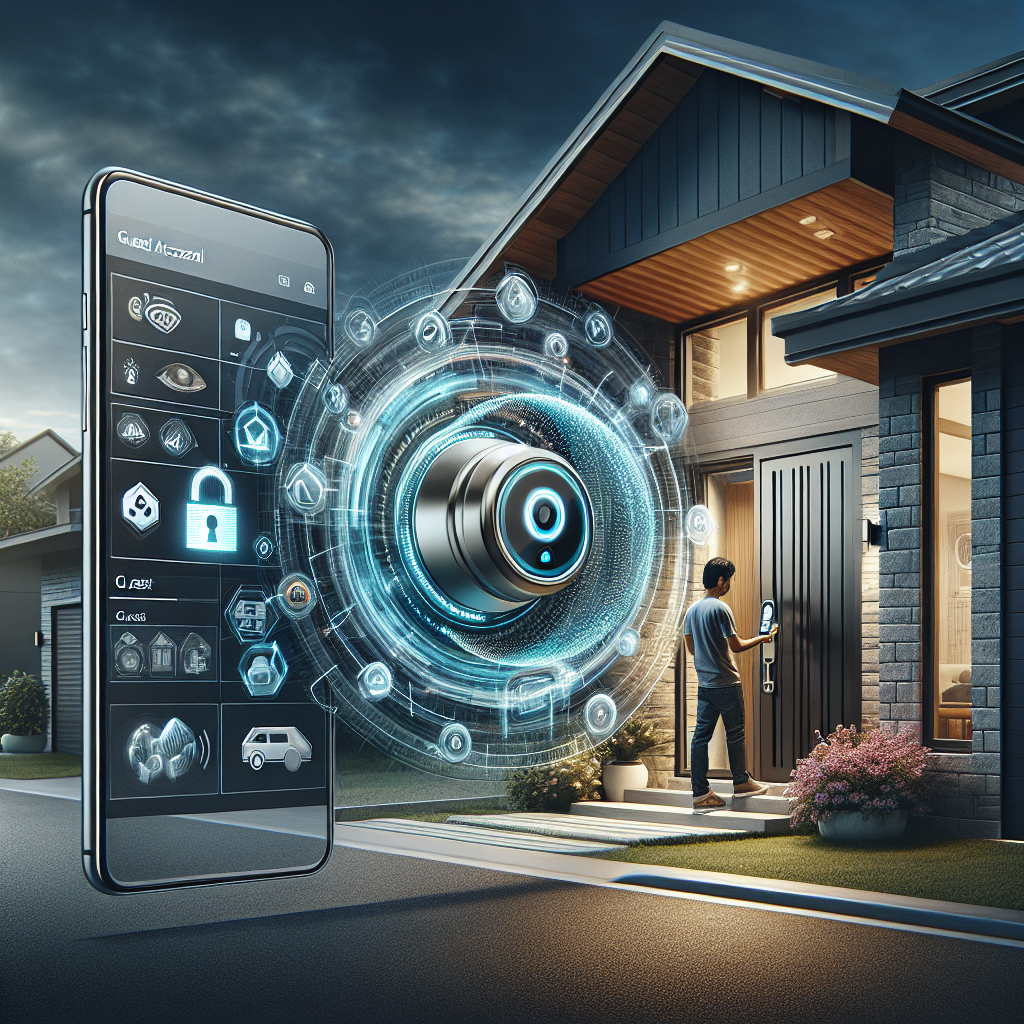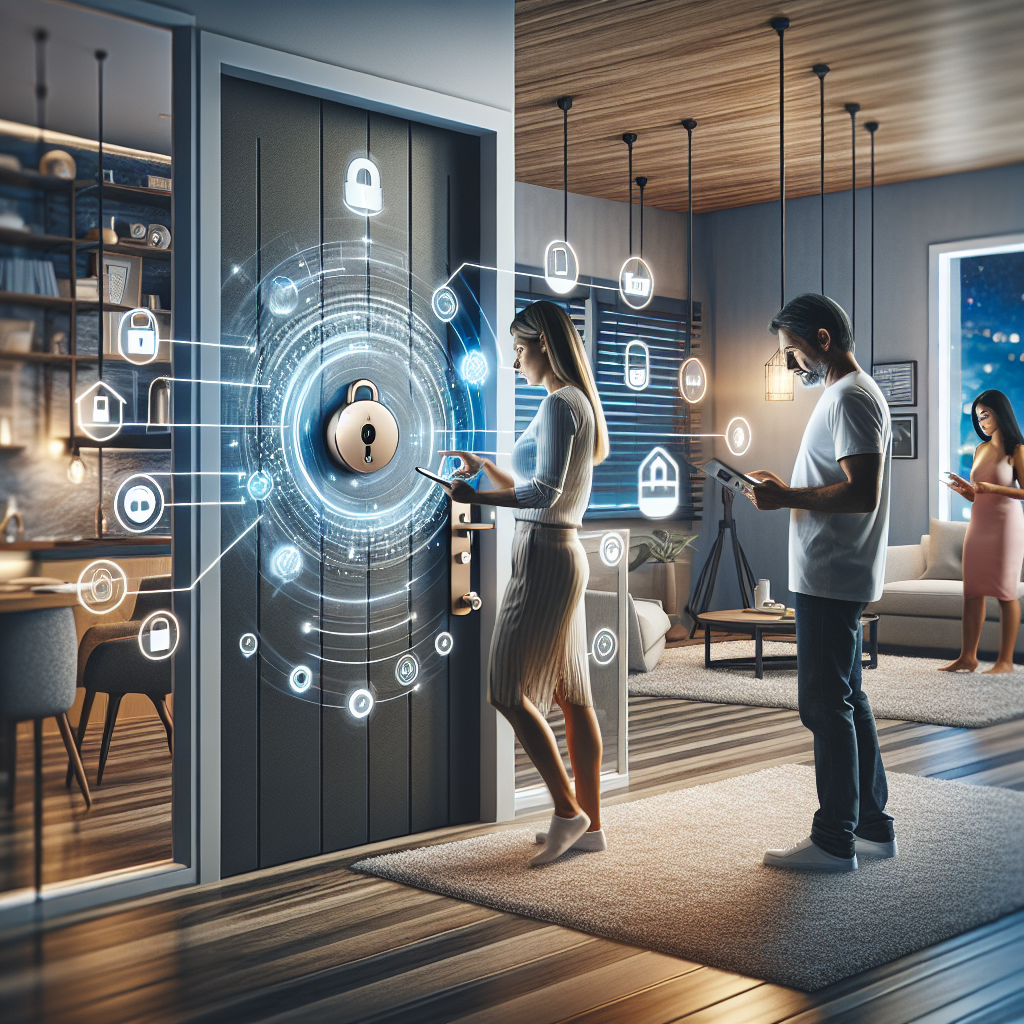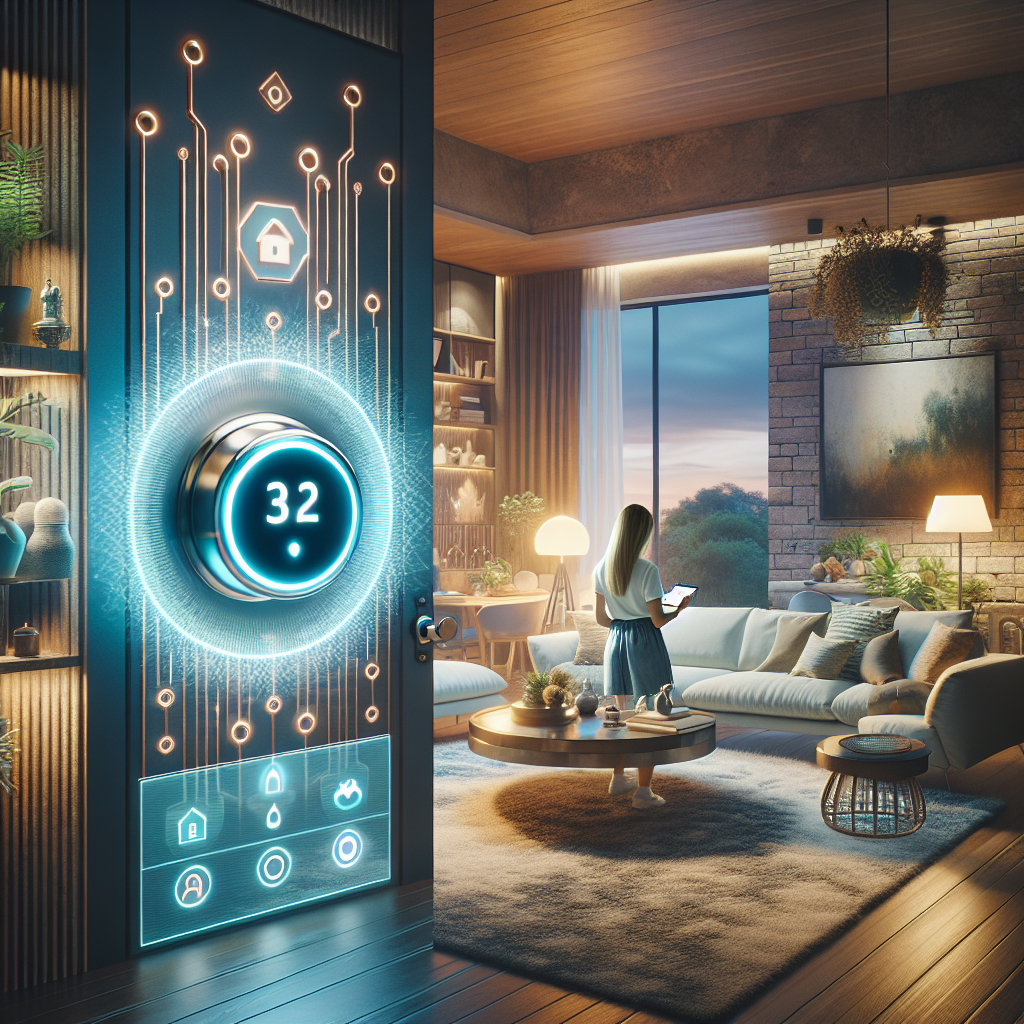In today’s ever-evolving world of technology, the future of home security lies in the palm of our hands with smart locks and innovative guest access control. Imagine a world where you can grant temporary access to your home with just a few taps on your smartphone, all while ensuring the utmost safety and security for you and your loved ones. Smart locks offer a seamless and convenient way to monitor and control who enters your home, providing peace of mind and flexibility like never before. Join us on a journey as we delve into the exciting world of smart locks and guest access control, and discover the endless possibilities for enhancing your home security.
Understanding Smart Lock Technology
Smart locks represent a revolutionary advancement in home security, offering a plethora of cutting-edge features that redefine the way we interact with our living spaces. These sophisticated devices are designed to provide seamless access control while enhancing the overall security of residential properties. To comprehend the profound impact of smart lock technology, it is essential to delve into the key features that distinguish these devices from their traditional counterparts.
Key Features of Smart Locks
- Remote Access: One of the standout features of smart locks is their ability to be controlled remotely via a smartphone app or a web interface. This functionality enables homeowners to lock or unlock their doors from virtually anywhere, providing unparalleled convenience and flexibility.
- Keyless Entry: Smart locks eliminate the need for traditional keys by offering alternative methods of entry such as PIN codes, key cards, or biometric authentication. This not only enhances security but also eliminates the risk of lost or stolen keys.
- Integration with Smart Home Systems: Smart locks can seamlessly integrate with other smart home devices, allowing for a cohesive and interconnected home automation ecosystem. This integration enables users to create customized security protocols and automate various aspects of their home.
- Activity Logs: Many smart locks are equipped with activity logs that provide a detailed record of who has entered or exited the property and at what time. This feature offers valuable insights into home security and can be particularly useful for monitoring guest access.
- Temporary Access Codes: Smart locks allow homeowners to generate temporary access codes for guests, service providers, or housekeepers. These codes can be easily revoked or modified, providing a high degree of control over who can enter the property and when.
How Smart Locks Differ from Traditional Locks
- Convenience: Unlike traditional locks that require physical keys, smart locks offer a higher level of convenience through keyless entry methods and remote access capabilities.
- Enhanced Security: Smart locks leverage advanced encryption and authentication protocols to ensure the security of the locking mechanism, making them more resistant to unauthorized access compared to traditional locks.
- Customization: Smart locks provide users with the ability to customize access permissions, create temporary codes, and monitor entry activity, offering a level of control and flexibility that is not possible with traditional locks.
- Integration: Smart locks can seamlessly integrate with other smart home devices and security systems, allowing for a holistic approach to home security that goes beyond the capabilities of traditional locks.
Benefits of Smart Locks
-
Enhanced security features
Smart locks offer an advanced level of security compared to traditional locks. They utilize encryption technology to prevent unauthorized access, and some models even have features like biometric recognition or unique access codes, reducing the risk of break-ins. Additionally, smart locks can send real-time notifications to homeowners’ mobile devices, providing instant alerts about any suspicious activity. -
Convenience of remote access
One of the key advantages of smart locks is the ability to control access to your home remotely. Through a smartphone app or a web portal, homeowners can lock or unlock their doors from anywhere, whether they are at work, traveling, or simply away from home. This feature is particularly useful for granting access to guests, service providers, or family members when you are not physically present at the property.
Guest Access Control Features
-
Setting temporary access codes: Smart locks allow homeowners to generate temporary access codes for guests, service providers, or deliveries. These codes can be easily activated and deactivated, providing a flexible and secure way to grant entry without the need for physical keys. Homeowners can customize these codes based on the specific needs of each guest, ensuring that access is limited to the desired time frame.
-
Monitoring guest entry and exit times: With smart locks, homeowners can track when guests enter and exit the property. This feature offers peace of mind by providing real-time notifications of guest activity, allowing homeowners to stay informed about who is coming and going from their home. By knowing the exact times of guest access, homeowners can better manage their property and ensure that access is only granted when needed.
Enhancing Home Security with Guest Access Control
-
Limiting access to specific individuals: With smart locks and guest access control features, homeowners can now grant temporary access to specific individuals such as family members, friends, or service providers. This capability adds an extra layer of security by ensuring that only authorized individuals can enter the premises.
-
Revoking access remotely: One of the key advantages of guest access control is the ability to revoke access remotely. In case of an emergency or if there are any security concerns, homeowners can instantly remove access permissions from anyone who was previously granted entry. This feature offers peace of mind and control over who can enter the home at any given time.
Integration with Home Security Systems

In the realm of home security, the integration of smart locks with existing home security systems presents a pivotal advancement in safeguarding residential properties. This integration encompasses a seamless connection between smart locks and a network of other smart home devices, creating a comprehensive security ecosystem that operates cohesively to fortify the protection of the home.
Compatibility with Smart Home Devices
One of the primary advantages of integrating smart locks with home security systems is their compatibility with a myriad of smart home devices. These smart locks can be synchronized with other security components such as surveillance cameras, motion sensors, and alarm systems, enabling a synchronized approach to monitoring and securing the premises. This compatibility ensures that the smart lock acts as a central component within the larger security infrastructure, allowing for real-time communication and data sharing among the interconnected devices.
Enhancing Overall Home Security Network
Through the integration of smart locks with home security systems, there is a significant enhancement in the overall security network of the residence. The smart lock serves as an entry point that not only controls access to the property but also acts as an intelligent gatekeeper that regulates the flow of individuals in and out of the premises. By linking the smart lock to the broader security framework, homeowners can bolster their defense mechanisms against potential intrusions or unauthorized entries, thereby fortifying the perimeter of their property.
In conclusion, the integration of smart locks with home security systems represents a pioneering development in the evolution of residential security measures. By seamlessly merging these advanced technologies, homeowners can establish a sophisticated security infrastructure that is interconnected, responsive, and highly effective in safeguarding their living spaces.
Potential Vulnerabilities and Solutions
In the realm of smart locks and guest access control systems, there are inherent vulnerabilities that need to be addressed to ensure robust home security. Here are some potential vulnerabilities and solutions to consider:
- Unauthorized Access: One of the primary concerns with smart locks is the potential for unauthorized access by hackers or individuals with malicious intent. This could lead to break-ins or theft if not properly mitigated.
-
Solution: Implementing strong encryption protocols and multi-factor authentication can significantly reduce the risk of unauthorized access. Regularly updating firmware and software patches is also crucial to address any identified vulnerabilities promptly.
-
Remote Hacking: Smart locks that can be controlled remotely via mobile apps or online platforms are susceptible to hacking if not adequately protected.
-
Solution: Utilizing secure communication channels such as end-to-end encryption and secure VPN connections can help prevent remote hacking attempts. Setting up intrusion detection systems can also alert homeowners to any suspicious activity.
-
Physical Tampering: Physical tampering of smart locks, such as manipulation of the locking mechanism or tampering with the hardware, can compromise home security.
-
Solution: Opting for tamper-resistant smart locks with robust construction and tamper detection features can deter physical tampering attempts. Additionally, installing security cameras or sensors near the smart lock can provide added protection against unauthorized access.
-
Data Privacy Concerns: Collecting and storing personal data, such as access logs and user information, raises concerns about data privacy and potential misuse.
- Solution: Adhering to data protection regulations, such as GDPR compliance, and implementing privacy-enhancing technologies like data anonymization and encryption can safeguard user privacy. Providing clear consent mechanisms for data collection and usage is essential to build trust with users.
By proactively addressing these potential vulnerabilities and implementing the suggested solutions, homeowners can enhance the security of their smart lock and guest access control systems, paving the way for a safer and more secure living environment.

User-Friendly Interface
- Easy Setup and Programming
Smart locks designed for the future of home security prioritize simplicity in installation and programming. Homeowners can easily set up the smart lock system without requiring extensive technical knowledge. Typically, the setup process involves connecting the smart lock to the existing door mechanism and syncing it with a designated mobile application. Guided instructions and intuitive interfaces ensure that users can complete the setup within minutes, enhancing convenience and accessibility.
- User-Friendly Mobile Applications for Remote Access
The future of home security lies in the seamless integration of smart locks with mobile applications that offer advanced functionalities for remote access control. These user-friendly apps enable homeowners to manage access permissions, monitor entry logs, and receive real-time notifications on their smartphones. Through a visually appealing and intuitive interface, users can easily grant temporary access to guests, service providers, or family members from anywhere, at any time. The mobile applications also allow for customization of security settings, such as scheduling automated lock/unlock actions based on specific criteria, further enhancing the overall user experience.
Customization Options for Users
-Friendly Interface
- Personalizing Access Codes: With smart locks, users have the ability to create unique access codes for different individuals, allowing them to track who enters their home and when. This feature not only enhances security but also provides a convenient way to grant temporary access to guests or service providers.

– Setting Access Restrictions Based on Time or Day: Another key customization option is the ability to set specific time or day restrictions for access codes. This means that users can control when certain codes are active, ensuring that guests can only enter during specified hours or days. This feature adds an extra layer of security and flexibility to home access management.
Future Developments in Smart Lock Technology
- Advancements in biometric authentication
In the future, smart locks are likely to incorporate more advanced biometric authentication methods such as facial recognition, voice recognition, or even DNA recognition. These technologies offer a higher level of security as they rely on unique biological characteristics that are difficult to replicate. Biometric authentication can significantly enhance the overall security of smart locks by ensuring that only authorized individuals can access the property.
- Integration with artificial intelligence for predictive security measures
Artificial intelligence (AI) is poised to revolutionize the field of home security by enabling smart locks to implement predictive security measures. By analyzing patterns of user behavior and detecting anomalies, AI-powered smart locks can proactively identify potential security threats and take preemptive actions to mitigate risks. For example, if an unusual access attempt is detected, the smart lock could automatically trigger an alarm or alert the homeowner, enhancing the overall security of the property.
FAQs for Exploring the Future of Home Security with Smart Locks and Guest Access Control
What is a smart lock with guest access control?
A smart lock with guest access control is a modern security solution that allows homeowners to grant temporary access to guests, such as family members, friends, or service providers, without the need for physical keys. Users can easily manage access permissions through a mobile app, granting or revoking access as needed. This technology adds an extra layer of convenience and security to traditional lock systems.
How does a smart lock with guest access control work?
Smart locks with guest access control utilize Bluetooth, Wi-Fi, or a combination of both to communicate with a user’s smartphone or other connected devices. Homeowners can create virtual keys and send them to guests’ smartphones, allowing them to unlock the door using the mobile app. Access can be scheduled for specific times or days, and homeowners receive notifications when someone enters or exits their property. These locks also offer the option to remotely lock or unlock the door, adding an extra level of convenience.
Are smart locks with guest access control secure?
Smart locks with guest access control use encryption and other security measures to protect against unauthorized access. Users can also monitor access logs to track who has entered or exited their property and at what times. Additionally, many smart locks offer features such as built-in alarms, tamper detection, and auto-locking capabilities to enhance security. While no system is completely infallible, smart locks with guest access control provide a high level of security compared to traditional lock-and-key systems.
Can multiple guests have access to a smart lock with guest access control?
Yes, smart locks with guest access control typically allow homeowners to grant access to multiple guests at once. Each guest can be assigned their own virtual key with unique access permissions, such as specific days or times they can enter the property. Homeowners have the flexibility to customize access for each guest, tailoring it to their individual needs. This feature is particularly useful for Airbnb hosts, landlords, or families with frequent visitors.